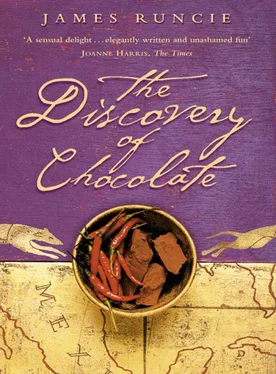I steeled myself to concentrate on my duties, but was surprised to find that all seamen were expected to sew. Although this seemed an effeminate occupation, it was taken extremely seriously, and I discovered that the neatest hem-stitchers were even given extra rations, the task of patching and making sails being considered so vital to the success of our endeavours. I was detailed to pick old rope apart and then re-use it to make ladders, or ratlines, by which our men were able to scramble to points aloft. I subsequently found myself spending many hours on deck involved in their construction, proving so adept at the task that I was soon promoted to making lanyards and shroud stays.
After seven weeks, we landed in Cuba.
It was the feast of the Epiphany, fifteen hundred and nineteen. I had expected it to be winter, but the air was filled with the sweet scents of tamarind and jacaranda, hibiscus and bougainvillea. This was, indeed, a New World.
At noon the next day we met the Governor of the islands, Diego de Velázquez, who had been in these lands some five years. He bid us welcome and informed us that our arrival was timely: there was an expedition underway to discover new territories a few weeks hence, led by one Hernán Cortés.
Of good stature, broad-shouldered and deep-chested, with fair, almost reddish hair, worn long and with a beard, Cortés possessed neither patience nor self-doubt. He determined to use my skills as a notary, and asked me to record every detail of his journey to the Americas, issuing declarations, recording confessions and sending accurate relaciones back to Spain. I would also be called upon to write out and proclaim new oaths of allegiance to Queen Doña Juana and her son, the Emperor Charles V, made by the caciques , or leaders, of the realms that we would surely conquer.
And so it was that on the tenth of February fifteen hundred and nineteen, just after Mass, I, Diego de Godoy, and my over-eager dog, Pedro the greyhound, boarded the lateen-rigged caravel San Sebastián and began to sail along the coast of Yucatán in the company of ten other ships under the leadership of the aforementioned Cortés. Diego de Velázquez attempted to recall us from the journey at the very last minute, questioning the legitimate authority of Cortés to colonise further lands without the consent of His Majesty, but our General was in no mood to turn back. The adventure had begun, and I now found myself in the company of friends upon whose abilities my life would come to depend: Antonio de Villaroel, the standard-bearer; Anton de Alaminos, the pilot; Aguilar, the interpreter; Maestre Juan, the surgeon; Andres Nuñez, the boat-builder; Alonso Yañez, the carpenter; together with some thirty-two crossbowmen, thirteen musketeers, ten gunners, six harquebusiers, two blacksmiths, and, to keep us hearty, Ortiz, the musician, and Juan, the harpist, from Valencia.
Hernán Cortés may have been an irascible commander, quick to find fault with people in his charge, but his ways were softened by his devoted companion Doña Marina, the daughter of a Mexican cacique , whom he had been given in the province of Tabasco. A most comely woman, with long dark hair, golden skin and deep brown eyes, Doña Marina had a natural authority. She also seemed unwilling to wear a corset, preferring loose and revealing clothing which fell easily from her body, exposing areas of soft and rounded flesh that were the very essence of temptation. She possessed the most sensual of walks: lilting and slow, with her body arched back and her breasts held high, as if she was quite accustomed to being the most beautiful person wherever she went.
I must confess that I found her disarmingly attractive, and soon could not stop myself thinking about her. Courteous and calm, Doña Marina was someone I needed to befriend, since she and Aguilar were the only people who could speak the native tongue of Nahuatl, and I was certain that I would need her aid if I was to fulfil my quest.
Sailing off the coast of Cempaola, we were greeted in a friendly fashion by some forty Indians in large dugout canoes. They had pierced holes in their lips and ears, and had inserted either pieces of gold or lapis. This jewellery glinted in the light, and both their nakedness and their beauty amazed me. They shouted, ‘Lope luzio, Lope luzio,’ and pulled up alongside our ships, offering fine cotton garments, war clubs, axes and necklaces. As they prepared to climb aboard, one of them stumbled and let fall from his pack into the sea a handful of what appeared to be dried brown almonds, and became much distressed. Nobody could see clearly what these articles were, but others began to check that they had not done the same, looking about their bodies for these strange dark objects, and counting them in their hands. The leader of the sailors then climbed aboard with several of his officials, and began to point at the land ahead, as if encouraging our men to go there. After weighing anchor, our camp was established on the shore, while I proceeded with Cortés and thirty soldiers to meet the local cacique , and to begin my written record of our adventures.
The chieftain at Cempaola was the fattest person I had ever seen. He was bare-chested, and an enormous expanse of flesh hung over his skirt and sandals, as if he were nothing less than a man mountain of lard and gold. Making a deep bow to Cortés, he then ordered that a petaca , or chest, filled with beautiful and richly worked golden objects – necklaces, bracelets, rings, cloaks and skirts – be placed before us. No one had ever seen such treasure before; there were mirrors set with garnets, bracelets of lapis, a helmet of stained mosaic and a maniple of wolfskin. The chest alone would surely have made a man’s fortune, but we were careful to seem unmoved by our first true glimpse of undreamed wealth. The cacique then unfurled ten bales of the purest white linen, embroidered with gold feathers. I immediately thought that this could have made the most glorious gown for Isabella and would have delved into my knapsack to offer my paltry goods in exchange had I been a more esteemed member of the party. But Cortés had forbidden any of us to converse with the cacique . He alone was to be the Master of Ceremonies, producing clear, green and twisted Spanish beads, as well as two exquisite holland shirts and a long-piled Flemish hat in return for these new treasures.
The citizens of Cempaola were amazed both by our armour and by our appearance, and now asked if we had come from the east, since, according to their religion, the god of the fifth sun was expected at any moment. Perhaps we were angels, or divine messengers?
Cortés now began to tell the Cempaolans of our Christian belief. He explained that they must accept our faith and cleanse their souls of sin, trusting in the promises of our Saviour, Jesus Christ, who had been sent by God to redeem us from death and grant us eternal life.
Bartolomé de Olmedo, the Mercedarian friar, now ordered that the whole town should take part in a Mass of Thanksgiving. The Cempaolans were given new Spanish names after the saints of our Church and christened in an enormous candle-lit ceremony. Eight Indian girls were then presented to the captains of our ships, who took them away for an altogether different kind of baptism.
One of the girls walked up to me and touched my beard (which I had grown in an attempt to look swarthy). She wore a short skirt, but her chest was naked, and as she caressed my face I looked down and saw how close her breasts were to my bare arms. They seemed so full and round, so perfect and inviting, that I could only just restrain myself from touching them. I had always assumed that my thoughts of Isabella would remain pure and in the forefront of my mind and was somewhat surprised that, at the first sight of such beautiful women, I should find myself becoming so swiftly overcome by passion. Perhaps I had little resistance to beauty, and fidelity might not be one of my strongest characteristics?
Читать дальше












